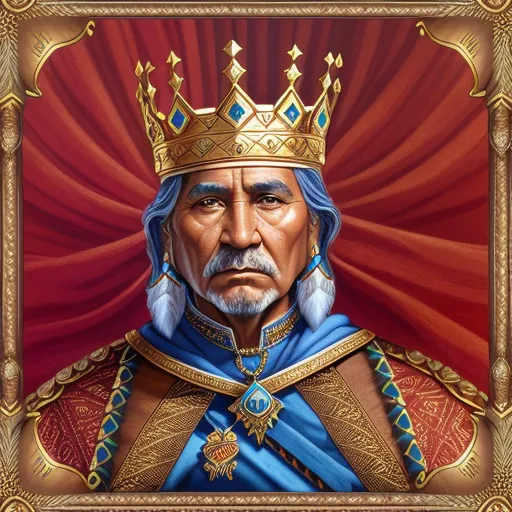
Nun Woo Ta awoke before sunrise to the sounds of the capital village stirring. As a boy, he had risen at dawn to join the other young hunters for rituals before venturing into the wilderness stalking elk and bison. Though now the aged king of the Ta-Nuu nation, Woo Ta maintained these simple hunter's habits that had carried him through his 63 years.
Woo Ta dwelled in the Great Tree Castle, an ancient fortress carved from a towering oak at the heart of the capital. From his window, he could survey the surrounding patchwork of corn fields, longhouses and spirit lodges housing his people. The Ta-Nuu were deeply spiritual, honoring totem spirits and communing with occult forces through rituals guided by their shamans.
As a young hunter, Woo Ta had roamed far across the forests and prairies, honing his skills in tracking prey and moving invisibly across the landscape he knew so intimately. It was said birds alighted on his shoulders to give him secret knowledge, and that deer willingly surrendered their lives to provide him sustenance.
In midlife, Woo Ta reluctantly joined the council of elders, knowing his wisdom could guide the Ta-Nuu nation. When the old king descended into madness, the council selected Woo Ta as his successor. Though missing his solitary life as a hunter, Woo Ta committed to serve his people justly.
Even as king, Woo Ta spurned opulent robes for simple leather breeches and moccasins. He refused to bear arms inside the village, reminding others that true strength came from forbearance and clarity of mind. Above all, he valued patience, honesty and caring for the weak.
Woo Ta's greatest friend was an orphaned wolf cub he once saved, who grew into his loyal companion. Though pressed to take a queen, Woo Ta remained unmarried and childless. He considered the Ta-Nuu people his extended family.
The only hint of fear Woo Ta displayed was regarding wildfires, having barely survived a prairie blaze in childhood. His face still bore old burn scars. To prevent uncontrolled fires, he oversaw controlled burns each year.
At times, Woo Ta regretted not living out his days solely as a hunter, without the heavy burdens of leadership. But he had sworn an oath to guide the Ta-Nuu nation, and he would see this duty through, until his ashes returned to the earth that had mothered him.
Though committed to serving as king, Woo Ta found the politics and pageantry of court life wearisome. He bristled at having servants dress him in the regalia of feathers, beads, and ermine pelts that were expected of Ta-Nuu royalty. The painted face and lavish headdress to him felt like masks, obscuring his true self.
Woo Ta's advisers continued pressing him to take a wife from either the noble families or a neighboring tribe to cement political alliances. But the wild-hearted Woo Ta resisted such arrangements, preferring to follow his own path.
In his scarce free time away from governing, Woo Ta would shed his royal trappings and slip beyond the village palisade into the embracing forest. Here he felt at peace again, breathing the loamy air and listening to the woodland sounds. He would sit silently beside a murmuring stream for hours, or climb rocky bluffs to survey the sweeping grandeur of his homeland.
Woo Ta never fully healed from the childhood wildfire that had seared his face and broken his trust in the land's benevolence. He knew nature could be a source of both beauty and destruction. This duality fueled his drive to protect the Ta-Nuu people from threats both within and beyond their borders.
As an older man, Woo Ta was plagued by recurring nightmares where the Great Tree Castle burned while he remained trapped inside, unable to save anyone. He woke in a panic from these dreams, their dark symbolism unsettling him in a way few things could.
Some Ta-Nuu elders speculated Woo Ta had never fully embraced his royal duties because he lacked his own offspring. But Woo Ta dismissed such talk, believing he needed no biological heirs to validate his reign or vision. The welfare of his people was heir enough. Still, he wondered what legacy he would truly leave behind when his ashes returned to the prairie soil.